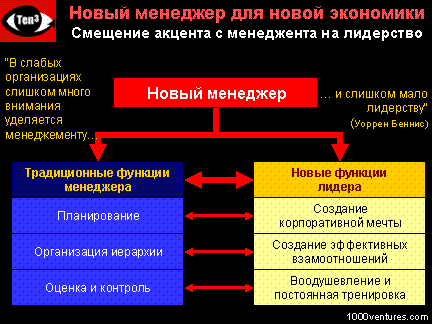|
Современный менеджемент |
Вадим Котельниковa, автор первого в мире Бизнес е-Тренера для новых лидеров, 1000ventures.com
"Management is about human beings. Its task is to make people capable of joint performance, to make their weaknesses irrelevant" - Peter Drucker

|
What is Management? Management is more art than science. Managing is working with and through other people to accomplish the objectives of both the organizations and its members. Managing in the New Era of Rampant Change, Knowledge Enterprise, Pervasive Globalization, and Increasing Complexity Rapid change that is sweeping through every aspect of business today prompts you to rethink the way you do things. Although the traditional management model has evolved quite a bit, it is still geared to a rigid structure and command-and control mentality. This model was well tailored to an environment where change was slow and evolutionary rather than rapid and revolutionary. It helped organize processes and foster a sense of accountability, order, and discipline. What it lacks is flexibility making the company irresponsive to continuous external and internal changes. We have reached a limit to what can be accomplished using traditional management approaches, but by changing the way we manage, that constraint can be removed. This is not to say that the basics of traditional management should be ignored, but they are just not enough to get the job done any more.17 To compete successfully in the global arena, you must create new act as an entrepreneur and create new business models - rethink, re-plan, strategize, innovate, and learn continuously. Once reliable guides for managerial action no longer exist. "In an environment virtually bereft of the old rules of conducting business there is no safety net. Every process, procedure, rule of thumb, and standard ratio is being challenged, reengineered, and morphed into a new form".11 This fundamental change has brought a daunting new reality to the challenge of growing and managing businesses. Leadership - the New Managerial Task In the new era of rapid changes and knowledge-based enterprises, managerial work becomes increasingly a leadership task. Leadership is the primary force behind successful change. Leaders empower employees to act on the vision. They execute through inspiration and develop implementation capacity networks through a complex web of aligned relationship...More The Difference Between Effectiveness and Efficiency There is vital distinction between effectiveness and efficiency:
The Concept of Effective Management Though there is a great variety of different types of businesses, the general principles of effective management apply in 90% of cases. The differences in management practices are mainly in application than in principles. Effectives management is not limited to business management only. Management is the specific and distinguishing organ of all organizations. Its functions are:
The task of the manager is to lead people. And the goal is to make productive and specific strengths and knowledge of each individual. The Main Business Purpose "Enterprises are paid to create wealth... The only valid definition of business purpose: to create a customer... The foundations have to be customer values and customer decisions. It is with those foundations that management policy and management strategy increasingly will have to start."2 Therefore customer values and decisions are the starting point for the actual practice of management, its policy and strategy. The Management Team Four quite different types or person are required to fulfill the role of chief executive successfully: thought man, action man, people man, and front man. Those four temperaments are almost never found in one person. "The one-man top management job is a major reason why businesses fail to grow... The management has to be a discipline, an organized body of knowledge that can be learned." The necessity of building a management team is central in the concept of leader effectiveness. A critical aspect of every manager's job is managing oneself. Aim to improve your skills in each of the five manager's essential functions - setting objectives; organizing the group; motivating and communicating; measuring performance; and developing people - and assess your progress throughout the learning process... More Advanced Management Program (AMP) The Harvard Business School's Advanced Management Program (AMP) puts elite members of the business world through a rigorous nine-week, $44,000 training session, taking them to a level of excellence and success that sets them apart from many others11. AMP emphasizes the three pillars of managerial excellence:
Decentralization and Delegation The main principle of decentralization is telling people what is to be done, but letting them achieve it their own way. The leader should concentrate on his or core competence areas and only do the tasks that nobody else can do. Other tasks should be delegated. Delegation is the process that makes management possible, because management is the process of getting results accomplished through others. A manager should provide team members with the information they require to do a good job, communicating with them frequently, and giving them clear guidelines on the results that are expected. Further, managers must also take the "relationship responsibility" for those with whom they work... More Coaching - the New Managerial Task Coaching aims to enhance the performance and learning ability of your employees. Coaching at work involves providing feedback, effective questioning and consciously matching your managerial style to the coachee's readiness to undertake a particular task12. The coaching approach, a generosity, born of maturity, opens the door to a new way of interfacing with your organization, and makes people want to follow your lead, accomplish your mutual goals. "The more you give in terms of coaching, mentoring, empathizing - the more you will achieve in terms of measurable business goals11"... More Cross-Pollinating Your Ideas with Others In the new economy driven by systemic innovation, new ideas arise from cross-pollination - complex interactions between many individuals, organizations and environmental factors. Sharing ideas and observations with an outside board of directors, consultants, lawyers, accountants, bankers, and peers will help you to build your cross-functional excellence, to broad your perspective in a complex environment, and keep solutions on-target. Exchange of ideas among peers, e.g. within networking groups, such as executives organizations, is not only useful within an industry; it is also a means of learning about best practices in related industries. Sharing company information once protected as proprietary has become a common practice - in strategic alliances, partnerships, joint ventures and other linkages that may involve even your competitors. Today, it is difficult for one business to have all answers, but when you network and link with multiple companies to bring total solution to your customers, you become a much more valuable supplier...More Kaizen - the Japanese Concept of Effective Management Kaizen strategy calling for never-ending effort for improvement at all organizational levels, is the most important Japanese management concept and the key to the country's competitive advantage. Kaizen concentrates at improving the process rather than at achieving certain results. Such managerial attitudes make a major difference in how an organization masters change and achieves improvements... More
|
Bibliography:
-
"Management: Tasks, Responsibilities, Practices", by Peter Drucker, 1974
-
"The Frontiers of Management", by Peter Drucker, 1986
-
"Managing in Time of Great Change", by Peter Drucker, 1995
-
"Management Challenges for the 21st Century", by Peter Drucker, 1999
-
"Kaizen - The Key to Japanese Competitive Success", by Masaaki Imai, 1991
-
"Growing Your Business", PricewaterhouseCoopers, 2001
-
"Venture Catalyst", Donald L. Laurie, 2001
-
"Project Manager's MBA", Cohen E. Graham, 2001
-
"The New Superleadership", Charles C. Manz and Henry P. Sims, Jr., 2002
-
"Leadership - Magic, Myth, or Method?", J.W. McLean and William Weitzel, 2001
-
"Extreme Management", Mark Stevens, 2001
-
"The Tao of Coaching", Max Landsberg, 1997
-
"Motivate to Win", Richard Denny, 2002
-
"Relentless Growth", Christopher Meyer, 1998
-
"80/20 Principle", Richard Koch, 1998
-
"It's Not the Big that Eat the Small... It's the Fast that Eat the Slow", Jason Jennings and Laurence Haughton, 2000
-
"The Centerless Corporation", by Bruce A.Pasternack and Albert. J. Viscio, 1998
-
"Essential Manager's Manual", Robert Heller and Tim Hindle, 1998
-
"Four Keys to Great Managers", The Gallup Organization, 2003




